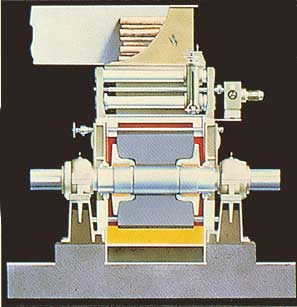| Pulp and paper industry | ||
Pulp wood pressure grinders or hoggers reduce the delivered wood to ground pulp or coarse chips. The coarse chips are then conveyed to a digester for "cooking" with boiling agents and steam. It is here that the pulp fibre (approx. 50 % of the wood) is separated from the other wood substances (lignin), leaving a brown pulp. In the follow-up grading plant, the brown pulp is cleaned, of heavily resinified insoluble wood remnants, after which it is washed, bleached and ground in refiners. (Coarse chips can also be grounded in refiners directly to pulp). As a highly diluted fibre mixture it is then fed via a pulp chute onto the dandy rollers of the paper machine. |
Here the pulp is drained, compacted into a web (press section), dried on heated rollers (drying section), smoothed on glazing rollers, and finally rolled up at web speeds of 100 km/h and higher. A paper factory usually has its own power station and an effluent treatment plant (for environmental protection, recycling of chemicals from the spent cooking liquor, production of combustion energy from the thermal effluent treatment plants). Nowadays, the majority of pumps and other machines in the pulp and paper industry are sealed by mechanical seals. |
|
| Wood pressure grinder |
||
| Peeled logs cut in one meter lengths are pressed onto the grindstone by hydraulic cylinders. Hot water (approx. 120 °C) is added, and a pressure of around 3 bar is applied inside the grinder. The grinder has a dead weight of approximately 17 t and a diameter of 1.8 m. Split-type single mechanical seals are used. |  |
|
| Pumps, e.g. pulp pumps |
||
The shaft
stuffing box of a pulp pump can be affected by increases of pulp density and vacuum.
If this risk exists under the given operating conditions, it is advisable to protect all single mechanical seals against dry
running by means of a quench. Following mechanical seal
designs have proven successful:
|
Pulp pump with single-acting, balanced
mechanical seal with encapsulated spring. Pulp density 1.6 to 3% Single product-flushed mechanical seal for pulp densities of over % abs. dry |
|
| Disk refiners |
||
A successful mechanical seal
design for disk refiners
|
Disk refiners are
used in the pulpwood grindings and defiberizing prozess |
|